Our ProductsWe are the best in Cloud Technology
- Home
- Products
- AMARI Load Balancer
- AMARI Virtualization Server
- AMARI Net Storage
- AMARI UPS Monitoring
- AMARI Massive Data Storage
- AMARI Virtualization Cluster
- AMARI SSD Turbo Storage
AYI137 - Load Balancer
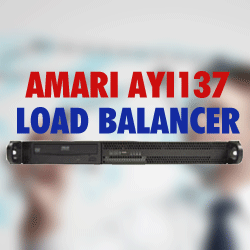
AMARI AYI137 Highlights
Load Balancer – is designed for growing workloads and features:- 6 X GbE ports
- 3.2 Gbps L4 balancer throughput
- SSL Transactions Per/Second (TPS): 3,500
- Servers Supported: 2,100 Physical / 800 Virtual
- Requests per second (HTTP): 87,000
AMARI AYI137 is an advanced, multi-port application delivery controller with Layer 7 content switching, and integrated ASIC-based SSL acceleration. The AMARI AYI137 load balancer intelligently and efficiently optimizes user traffic, offloads and accelerates Layer 7 applications such as SSL security and content, to optimize web and application servers. The AMARI AYI137 gives IT administrator’s greater control, and enables them to easily adapt to network changes by providing a resource optimization layer in front of applications and servers.
The AMARI AYI137 is an essential component of for any company seeking increased application and server availability, clustering and fault tolerance, all of which provide the infrastructure for reliable applications, Internet sites and corporate intranets. The AMARI AYI137 enables site administrators to optimize server traffic according to content type (images, multi-media, apps) and optimizes server performance and user experience for encrypted application content. Combining the latest advancements in content switching with a high-performance hardware platform, the AMARI AYI137 is the value leader in application delivery optimization. The AMARI AYI137 provides an unmatched combination of availability and performance for mission-critical servers and applications.
Standard
- Server Load Balancing (SLB) for TCP/UDP based protocols
- SSL Acceleration/Offload in ASIC
- Layer 7 Content Switching
- Advanced, App-Transparent Caching Engine for HTTP/HTTPS protocols
- Optimized Compression for Static and Dynamic HTTP/HTTPS Content
- Layer 7 Intrusion Prevention System (IPS), SNORT-Rule Compatible
- Up to 800 Virtual and 2100 Real Servers
- NAT-based forwarding
- Support for Direct Server Return (DSR) configurations
- Support for MS Terminal Services with Session Reconnection Built-in
- Configurable S-NAT support
- VLAN Trunking (802.1Q)
- Link Interface Bonding (Modes supported: 802.3ad, Link Failover)
Performance
- Max Balancer L4 Throughput Up To 1.7Gbps
- Max Balancer L7 Throughput Up To 1.5Gbps
- Max Interface Throughput 4 X 949.2Mbps
- 69,000 L7 (http) requests per second
- 100,000 L7 concurrent connections
- SSL Transactions Per/Second (TPS): 2,000
SSL
- SSL Acceleration up to 2000 TPS
- ASIC-enabled, hardware SSL Acceleration
- PCI-DSS Requirement #4 ready SSL Implementation
- Support for up to 256 SSL Certificates
- Support for Third Party Certificates
- Automated SSL Certificate Chaining
- SSL Certificate Signing Request (CSR) Generation
Health Checking and High Availability
- ICMP health checking of server farm machines
- Layer 7 checking for DNS, FTP, HTTP, IMAP, NNTP, POP3, SMTP, WTS (RDP), TELNET
- Automatic reconfiguration for defective real server machines
- Active/Hot Standby configurations for High Availability
- Stateful Failover
Administration
- Fully configurable using Web User Interface (WUI)
- Secure, SSH and HTTPS (WUI) remote access for administration
- Easy start and maintenance using wizards
- WUI-based Help Assistant
- Virtual Service Configurations can be edited and tuned on-the-fly
- Real time performance and availability displays
- Graceful Administrative removal of Real Servers
- Console port for local administration
- Remote syslogd support
- Selective restore of LoadMaster and Virtual Service data
- Support for Connection Draining
- Download software updates for LoadMaster firmware
- WUI Log Reporting with Tabbed Browser Support
- SNMP support for event traps & performance metrics
- Diagnostic shell with in-line tcpdump
Scheduling and Balancing Methods
- Round Robin
- Weighted Round Robin
- Least Connection
- Weighted Least Connection
- Agent-based Adaptive
- Chained Failover (Fixed Weighting)
- Layer 7 Content Switching
Sticky (Persistence) Connection Options
- Source IP (L4)
- SSL SessionID (L4)
- HTTP/HTTPS Browser-session (L7)
- HTTP/HTTPS WebClient-session (L7)
- RDP Login ID (L7)
- Port Following for mixed HTTP/HTTPS sessions
Security Functionality
- Layer 7 Intrusion Prevention System (IPS), SNORT-Rule Compatible
- Black List (Access Control List system)
- IP address filtering
- Firewall filtering (everything forbidden except VS’s)
- DDoS mitigation
Performance
- Servers Supported: 2,100 Physical /800 Virtual
- Max Balancer L4 Throughput Up To 3.2Gbps
- Max Balancer L7 Throughput Up To 2.9Gbps
- Max Interface Throughput 2 X 949.2Mbps
- 87,000 L7 (http) requests per second
- 120,000 L7 concurrent connections
- SSL Transactions Per/Second (TPS): 3,500
Hardware Specs
- Intel Dual Core
- 6 X GbE Auto-negotiating, Full Duplex Eth. Ports
- SSD 64GB
- 1 GB RAM
- 1U Case
- Local admin via console/VGA and USB
- Dimensions: 427 x 458 x 44 mm. Weight ~ 28.66bs (13kg)
- 350W ATX power supply
- Certifications: CE/FCC Class A, UL Listed, RoHS Compliant
SI234 - Virtualization Server
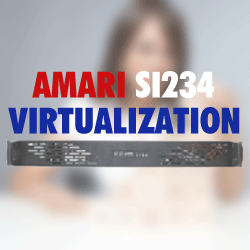
AMARI SI234 does more with less.
Get the right fit for different workloads with the same server hardware, or run different workloads within the same chassis.Concentrated performance
Maximize revenue per square foot and help gain increased application performance with less impact to your IT budget and footprint. With AMARI SI234, you can boost performance by setting up the perfect balance of cores, memory and I/O (input/output) within a single chassis. Global services and supportAMARI System Services can help reduce IT complexity, lower costs and eliminate inefficiencies by making IT and business solutions work harder for you. The AMARI System Services team takes a holistic view of your needs and designs solutions for your environment and business objectives while using established delivery methods, local talent and in-depth domain knowledge to help lower your total cost of ownership.
Built for performance
Get the right performance and fit for your hyperscale environments with the AMARI SI234, an excellent combination of compute, memory and I/O (input/output) performance in an ultra-efficient 4-in-2U chassis.Next-generation processing
Build your clouds and clusters with AMARI SI234 servers that harness the capabilities of Intel i7 processing performance inside Amari’s established shared infrastructure servers.Flexible server use
Mix and match workloads on different server nodes within the same chassis to maximize computing power, bandwidth and the AMARI SI234’s shared HDD resources.Designed for efficiency
Help reduce your operating costs by deploying ultra efficient AMARI SI234 servers in your scale-out environment.Shared infrastructure
Help maximize performance and operating efficiency with the established shared-infrastructure design of the AMARI SI234.Dynamic HDD allocation
Split capacity among the server nodes to better allocate the resources you need for your specific requirementsHyperscale environments
Put the AMARI SI234’s hyperscale-inspired design to work for you in high-workload-intensive environments.Technical Specification
Processor
Intel i7 3.4GHzOperating System
Debian 7 - 64bitHypervisor
KVM and OpenVZMemory
32GB DDR3 RAMStorage
64GB SSDPower
Dual hot-plug redundant high-efficiency 1200W/1400W power suppliesVideo Card
Integrated AST2300 with up to 16MB video RAMDimensions
Height: 8.68 cm (3.42 in.)Width: 44.8 cm (17.6 in.)
Depth: 79.0 cm (31.1 in.)
Weight (maximum configuration): 37 kg (81.6 lb.)
Weight (empty): 17.14 kg (37.8 lb.)
Connectivity
Intel Gigabit Ethernet Controller - 2 x 1Gb EthernetDI01 - Net Storage
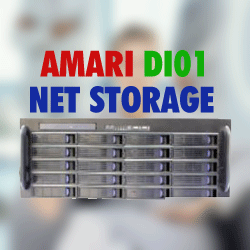
AMARI DI01 - A Complete Network Storage Solution
With muscular performance and outstanding scalability at a competitive price point, the AMARI DI01 Storage Server is the perfect solution for corporate backup and file sharing. It's powered by the industry-standard BSD powerful NAS platform. The AMARI DI01 combines block- and file-level storage for Windows or Linux operating systems in a single NAS. It also ships with 3GB WD Caviar Black disks, which feature redundant path technology that improves I/O results by more than 40%. All in all, the AMARI DI01 is a comprehensive network storage solution, complete with the software and hardware you need for serious backup or file sharing, right out of the box.Enterprise-Level Performance
Thanks to its server-grade components, the AMARI DI01 delivers server-grade performance. Powered by an Intel® i7 3.4GHz processor with 16GB RAM, it is powerful enough to perform multiple parallel tasks and is optimized for up to 250 users. It is perfect for NAS-to-NAS backup and file serving. It additionally features a native quad 1Gb LAN for superior network performance. You can leverage the multiple LAN ports for redundancy in case of Ethernet failure or load balancing for improved data transfer. You can even add up to 64 GB of RAM to push performance even higher and to adapt to your business' evolving needs.Scalability Without Compromise
Thanks to its I/O ports, you can connect external storage and integrate it as a JBOD array for massive scalability – up to 144TB*. The AMARI DI01 even features a hardware RAID controller, which supports RAID Levels 0, 1, 5, 10, 50 or 60, and manages all your storage without taxing the processor. This lets you "future proof" your investment, because you can increase your storage capacity as you need it, without needing to buy a new storage system. It gives you precise control over your array with automatic and customer RAID configurations and gives you broad flexibility for managing new capacity.iSCSI and Virtualization Flexibility
With the AMARI DI01, you can create a NAS/SAN hybrid system by configuring iSCSI. As an iSCSI target, its storage will mount on a workstation in the same way as direct-attached storage. This lets audio professionals work directly on centralized network storage, for example. It also gives IT administrators an easy way to allocate storage to multiple specific task-dedicated servers or for any other purpose. Configured as an iSCSI initiator, the AMARI DI01 can connect to any other iSCSI-compatible storage, letting you expand storage in a cost-effective way. Support for iSCSI also makes the AMARI DI01 a virtualization powerhouse, letting you assign dedicated storage to virtual machines. Dedicated CPU cores can be assigned to specific tasks for superior control over computing resources. You can assign a core to manage a mail server, another for backup tasks, and the remainder for running Windows workstations. Virtualization even lets you access the AMARI DI01 through network file system (NFS) protocol, allowing you to configure it as an NFS datastore.Technical Specification
Green Version
Processor
Intel i7 3.4GHzOperating System
FreeNAS 64bitMemory
32GB DDR3 RAMStorage
20x3GB 7200 rpm, 2 years warranty, efficient energyPower
Dual hot-plug redundant high-efficiency 1200W/1400W power suppliesConnectivity
Intel Gigabit Ethernet Controller - 2 x 1Gb EthernetEnterprise Version
Processor
Intel Xeon E5-2609Operating System
FreeNAS 64bitMemory
32GB DDR3 EEC RAMStorage
20x3GB 7200 rpm, 2 years warranty, Special for NASPower
Dual hot-plug redundant high-efficiency 1200W/1400W power suppliesConnectivity
Intel Gigabit Ethernet Controller - 2 x 1Gb EthernetUPS-01 - UPS Monitoring System
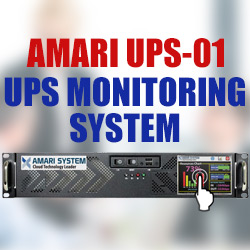
AMARI UPS-01 - Just A Touch Away
Daily power glitches and outright power failures are a fact of life and the key consideration that drives your investment in mission critical UPS monitoring systems.
Now you can be sure your UPS will work to support vital applications, systems and networks during the many everyday power disturbances and outright power failures that each business is almost certain to experience.
AMARI UPS-01 is UPS monitoring system that collect and report your UPS performance. AMARI UPS-01 also able to make some predefined action such as SMS or email when any malfunction occur with your UPS to reduce more risk in production process and business.
AMARI UPS-01 monitor feature works with UPS units that support SNMP over IP. This feature require UPS that comply with RFC 1628.
AMARI UPS-01 is loaded with FPD (Front Panel Display), touchscreen interface that show UPS parameters such as Realtime Load, UPS uptime, Brand and type of UPS, Appliance IP Address, UPS IP Address, UPS Overload Notification, Input Output Voltage and Input Output Ampere
In addition, AMARI UPS-01 able to do soft reboot itself to maintain stability and robustness using FPD.
AMARI UPS-01 Web Based Monitoring System show UPS Activities such as Voltage Ripple and Load Fluctuation so you can analize and predict what action should you do in future for operation sustainability
AMARI UPS-01 has designed with RESTful concept so it can easily communicate with your existing monitoring sytem
For enterprise security purpose, we have equiped AMARI UPS-01 with Active Directory Authentification so you dont have to remember more password to access AMARI UPS-01 Web Based Information System
AMARI UPS-01 has serve lot of companies in Europe and US to watch their UPS so their boss dont have to worried about backup energy when main power is down.
Technical Specification:
- 1. CPU Intel i3
- 2. RAM 2 GB
- 3. SSD 60GB
- 4. 1 Gigabit Ethernet Port
- 5. 3.2" Touch Screen FPD (Front Panel Display)
- 6. Web Based Information System with RESTful Architechture
- 7. Active Directory Authentification
- 8. RFC 1628 Compliant Monitoring Tools
AMARI D45 - Massive Data Network Storage
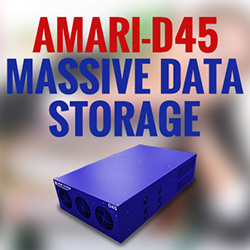
AMARI D45 - Simply Massive
AMARI D45 is a new, fully managed massive data network storage that manages and preserves skyrocketing volumes of digital assets with complete data integrity for as long as you need them (from months to several decades), with instant access, and at a low total cost of ownership.
Built on an robust and stable linux architecture to avoid vendor lock-in and backed by the industry's most comprehensive service-level agreements for service availability and data durability, portability, and survivorship.
AMARI D45 offers exabyte-scale elasticity and compatible with every data communication protocol such as FTP, NFS, SMB/CIFS , SCP and iSCSI. with max 180TB storage, you can save your documents, pictures and any digital information with peace of mind.
Technical Specification:
- 1. CPU Intel E5 2687W
- 2. RAM 64 GB
- 3. 45x4TB, 4 Gigabit Ethernet Port
- 4. Web Based Information System with RESTful Architechture
- 5. Active Directory Authentification)
- 6. RAID 0,1,5,6,7 with SATA 3 which is able to achieve 6GBps maximum data transfer rate
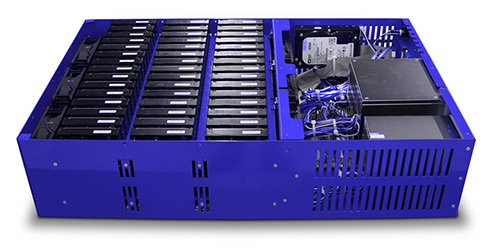
AMARI-V - Virtualization Cluster
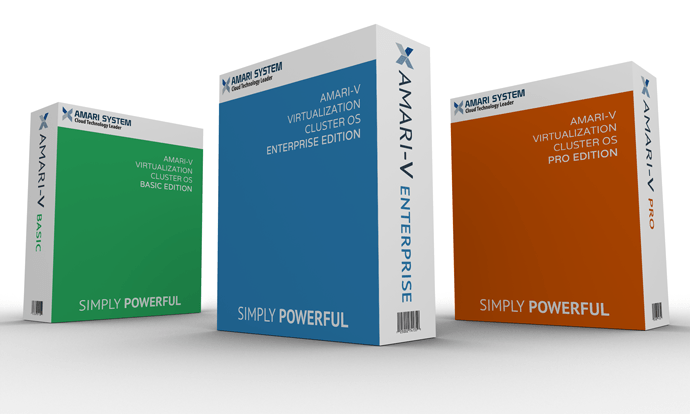
AMARI-V - Simply Powerful
AMARI Virtualization Cluster
Virtualization Cluster OS powered by KVM and OpenVZ
AMARI-V is a complete enterprise virtualization management solution for servers. It is based on KVM virtualization and container-based virtualization and manages virtual machines, storage, virtualized networks, and HA Clustering.
The enterprise-class features and the intuitive web interface are designed to help you increase the use of your existing resources and reduce hardware cost and administrating time - in business as well as home use. You can easily virtualize even the most demanding Linux and Windows application workloads.
Features
KVM & CONTAINER
Powerful and Lightweight
AMARI-V is open source software, optimized for performance and usability. For maximum flexibility, we implemented two virtualization technologies - Kernel-based Virtual Machine (KVM) and container-virtualization.
Kernel-based Virtual Machine (KVM)
Open source hypervisor KVM is a full virtualization solution for Linux on x86 hardware containing virtualization extensions (Intel VT or AMD-V). It is a kernel module added to mainline Linux.
With KVM you can run multiple virtual machines by running unmodified Linux or Windows images. It enables users to be agile by providing robust flexibility and scalability that fit their specific demands. AMARI Virtualization Cluster OS uses KVM virtualization since the beginning at 2006.
Container-based virtualization
OpenVZ is container-based virtualization for Linux. OpenVZ creates multiple secure, isolated Linux containers (otherwise known ass or VPSs) on a single physical server enabling better server utilization and ensuring that applications do not conflict. AMARI-V uses OpenVZ virtualization since the beginning of the project in 2006.
Live Migration
Move your running virtual machines and containers from one physical host to another without any downtime.
CENTRAL MANAGEMENT
Unique Multi-master Design
The clean Web-GUI gives you an overview of all your KVM guests and Linux containers and even of your whole cluster. There is no need for a separate and complex management server.
AMARI-V Cluster File System
AMARI-V uses the unique AMARI-V Cluster file system (amrcfs), a database-driven file system for storing configuration files. This enables you to store the configuration of thousands of virtual machines. By using corosync, these files are replicated in real time on all cluster nodes. The file system stores all data inside a persistent database on disk, nonetheless, a copy of the data resides in RAM which provides a maximum storage size is 30MB - more than enough for thousands of VMs.
AMARI-V is the only virtualization platform using this unique cluster file system.
Rich app Management Tool
AMARI-V is simple to use. You don't need to install a separate management tool or any additional management node with huge databases, everything can be done via the included Rich web app managment tool. The multi-master tool allows you to manage your whole cluster from any node of your cluster. The central web-based management - based on the JavaScript Framework (Ext JS 4) - empowers you to control all functionalities from the GUI and overview history and syslogs of each single node. This includes running backup or restore jobs, live-migration or HA triggered activities.
REST web API
AMARI-V uses a RESTful API. We choose JSON as primary data format, and the whole API is formally defined using JSON Schema. This enables fast and easy integration for third party management tools like custom hosting environments.
Role-based Administration
You can define granular access for all objects (like VM´s, storages, nodes, etc.) by using the role based user- and permission management. This allows you to define privileges and helps you to control access to objects. This concept is also known as access control lists: Each permission specifies a subject (a user or group) and a role (set of privileges) on a specific path.
Authentication Realms
AMARI-V supports multiple authentication sources like Microsoft Active Directory, LDAP, Linux PAM standard authentication or the built-in AMARI-V authentication server.
50+ Virtual Appliances for AMARI-V
Via the AMARI-V Central Web-based Management you can download and install over 50 virtual appliances to run as a OpenVZ container. A virtual appliance is a fully pre-installed and pre-configured application and operating system environment that runs on any standard server in a self-contained, isolated environment known as a virtual machine.
Our technology partner TurnKey Linux offers a huge range of ready-to-run appliances.
Backup and Restore
The integrated backup tool (vzdump) creates consistent snapshots of running OpenVZ VEs and KVM guests. It basically creates an archive of the VM or CT data and also includes the VM/CT configuration files.
KVM live backup works for all storage types including VM images on NFS, iSCSI LUN, Ceph RBD or Sheepdog. The new backup format is optimized for storing VM backups fast and effective (sparse files, out of order data, minimized I/O).
AMARI-V High Availability Cluster
AMARI-V HA Cluster enables the definition of high available virtual servers. If a virtual machine or container (VM or CT) is configured as HA and the physical host fails, the VM is automatically restarted on one of the remaining AMARI-V Cluster nodes.
The AMARI-V HA Cluster is based on proven Linux HA technologies, providing stable and reliable HA service.
NETWORKING
Bridged Networking
AMARI-V uses a bridged networking model. All VMs can share one bridge as if virtual network cables from each guest were all plugged into the same switch. For connecting VMs to the outside world, bridges are attached to physical network cards assigned a TCP/IP configuration.
For further flexibility, VLANs (IEEE 802.1q) and network bonding/aggregation are possible. In this way it is possible to build complex, flexible virtual networks for the AMARI-V hosts, leveraging the full power of the Linux network stack.
STORAGE
The AMARI-V storage model is very flexible. Virtual machine images can either be stored on one or several local storages or on shared storage like NFS and on SAN. There are no limits, you may configure as many storage definitions as you like.
The benefit of storing VMs on shared storage is the ability to live-migrate running machines without any downtime.
You can use all storage technologies available for Debian Linux.
You can add the following storage types via the web interface.
Network storage types supported
- LVM Group (network backing with iSCSI targets)
- iSCSI target
- NFS Share
- Ceph RBD
- Direct to iSCSI LUN
Local storage types supported
- LVM Group (local backing devices like block devices, FC devices, DRBD, etc.)
- Directory (storage on existing filesystem)
AMARI D30T - 30 SSD Turbo Storage
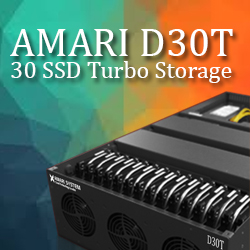
AMARI D30T - 30 SSD Turbo Storage
Distinguishably powered by dual Intel® Xeon® E5-2600 v3 processors (with 4-core, 6-core and 8-core configurations), up to 1TB DDR4 2133MHz RDIMM/LRDIMM RAM (16 DIMM), and 12Gb/s SAS drive support the AMARI D30T can deliver outstanding performance for data transmission and applications. While providing the power to handle CPU-demanding tasks and everyday application needs, the AMARI D30T's unrivaled performance provides the ability for businesses and organizations to improve their Big Data computing to gain further insights, opportunities and values.
Built on an robust and stable linux architecture to avoid vendor lock-in and backed by the industry's most comprehensive service-level agreements for service availability and data durability, portability, and survivorship.
When it comes to virtualization deployment, it usually requires high-performance application servers and high-capacity storage servers to build suitable environments. 10GbE or 40GbE networks are necessary to connect virtualization environments to storage via iSCSI or NFS protocols. AMARI’s powerful AMARI D30T combines all of these features into one box, saving more money and space as a one-device solution with exceptional application performance and lower TCO of storage.
AMARI D30T offers fastest exabyte-scale elasticity and compatible with every data communication protocol such as FTP, NFS, SMB/CIFS and SCP.
Technical Specification:
- 1. Dual CPU Intel E52620 v3
- 2. RAM 64 GB DDR 4
- 3. Dual port Fibre NIC
- 4. Web Based Information System with RESTful Architechture
- 5. Active Directory Authentification)
- 6. RAID 0,1,5,6,10 with SATA 3 which is able to achieve 6GBps maximum data transfer rate
Copyright 2000 - 2025 Amari-SystemAll Rights ReservedRSSComments
Back to the top